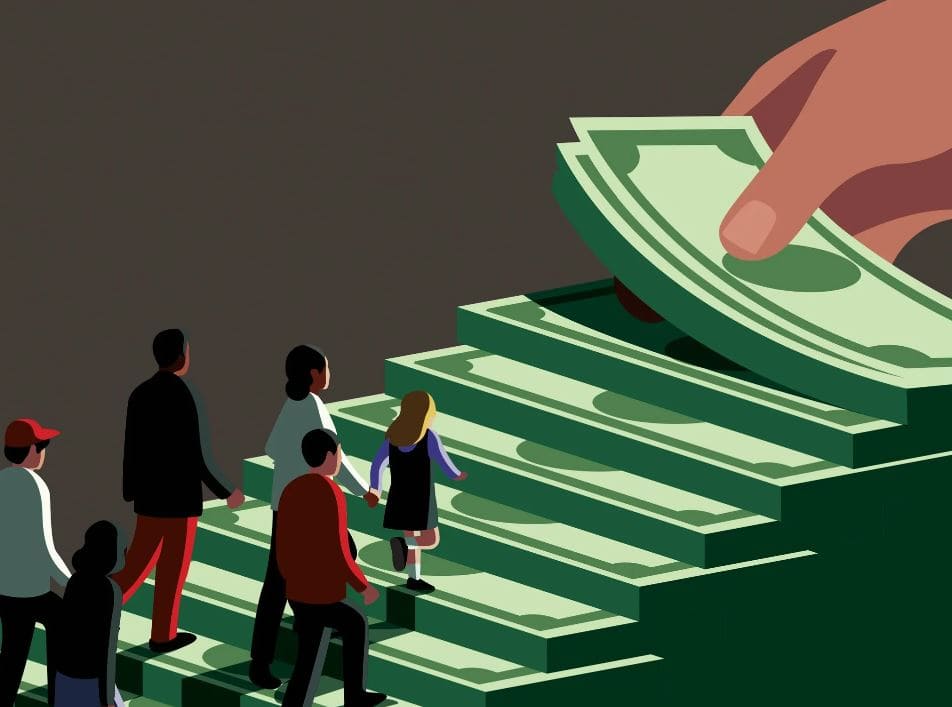Introduction
Universal basic income (UBI) has attracted significant attention due to its potential solutions for mitigating economic inequality since it allows governments to provide unconditional employment opportunities and regular payments to their citizens. From a proponent’s perspective, the approach can improve human creativity and entrepreneurial decision-making, promoting innovation and access to financial resources for individuals. However, the policy’s critics point to its potential as a disincentive to employment and challenges to its feasibility and implementation. UBI is a potential solution for governments to improve the lives of their citizens because this concept alleviates poverty and economic instability and improves human creativity and innovation, even though it can lead to implementation and feasibility challenge traps.
Alleviating Poverty and Economic Stability
UBI proponents suggest that this concept is a solution to promote economic stability and mitigate poverty among citizens. For example, the approach provides a beneficial public policy that fosters the achievement of financial equality and reduces poverty levels in the country (Riedl, 2020, p. 1). In this case, UBI provides an economic solution to stability by increasing the consumer’s expenditure and household income, leading to financial safety and ensuring increased access to necessities in the country. Thus, adopting UBI provides a crucial chance for countries experiencing unstable economic poverty levels to solve their challenges.

Improving Human Creativity and Entrepreneurship
UBI serves as a solution to unlocking human creativity by facilitating the spirit of entrepreneurship. For example, this concept promotes entrepreneurial decisions by increasing the perceived feasibility, desirability, and propensity to take action and create a business (Aceytuno-Pérez et al., 2023, p. 5). It increases the supply of financial resources, triggering an entrepreneurial mindset and innovation among the population. Hence, UBI is a solution that can increase investments through entrepreneurial efforts.
Implementation and Feasibility Challenge Traps
However, critics of UBI provide valid concerns about the increased prices of consumer goods and reduced incomes. For example, the approach offers the wrong motivation to individuals, which creates collective poverty and leads to unemployment due to the effect on price and revenue (Perkins et al., 2021, p. 4). In this case, UBI implementation faces challenges that can hinder its successful incorporation in multiple countries due to its adverse impacts, such as high taxes and government commitment, although its benefits surpass the associated drawbacks. As such, it is crucial to consider the underlying challenges of UBI before its implementation to foster the achievement of feasibility.
Conclusion
The debate surrounding UBI underscores significant solutions for the population worldwide, such as eliminating economic and poverty instabilities and improving human creativity, despite projecting the potentiality of a trap of feasibility and implementation. The approach provides potential financial stability and alleviates poverty by ensuring increased household income. Public policy is crucial in triggering innovative ideas by providing enough income for investment in entrepreneurial opportunities available in the market. However, its adoption can be a demotivation factor that can lead to increased unemployment, creating challenges in its implementation and feasibility. Despite the difficulties associated, UBI has significant benefits, even if it has its foreseen risks to individuals and the government. Therefore, countries must consider its feasibility drawbacks before implementing it to improve people’s lives.
References
Aceytuno-Pérez, M.-T., de Paz-Báñez, M. A., & Sanchez-López, C. (2023). Assessing the impact of the implementation of universal basic income on entrepreneurship. Basic Income Studies, 1–34. https://doi.org/10.1515/bis-2022-0022
Perkins, G., Gilmore, S., Guttormsen, D. S. A., & Taylor, S. (2021). Analyzing the impacts of universal basic income in the changing world of work: Challenges to the psychological contract and a future research agenda. Human Resource Management Journal, 32(1), 1–18. https://doi.org/10.1111/1748-8583.12348
Riedl, D. (2020). Financing universal basic income: Eliminating poverty and bolstering the middle class while addressing inequality, economic rents, and climate change. Basic Income Studies, 15(2), 1–34. https://doi.org/10.1515/bis-2020-0013


